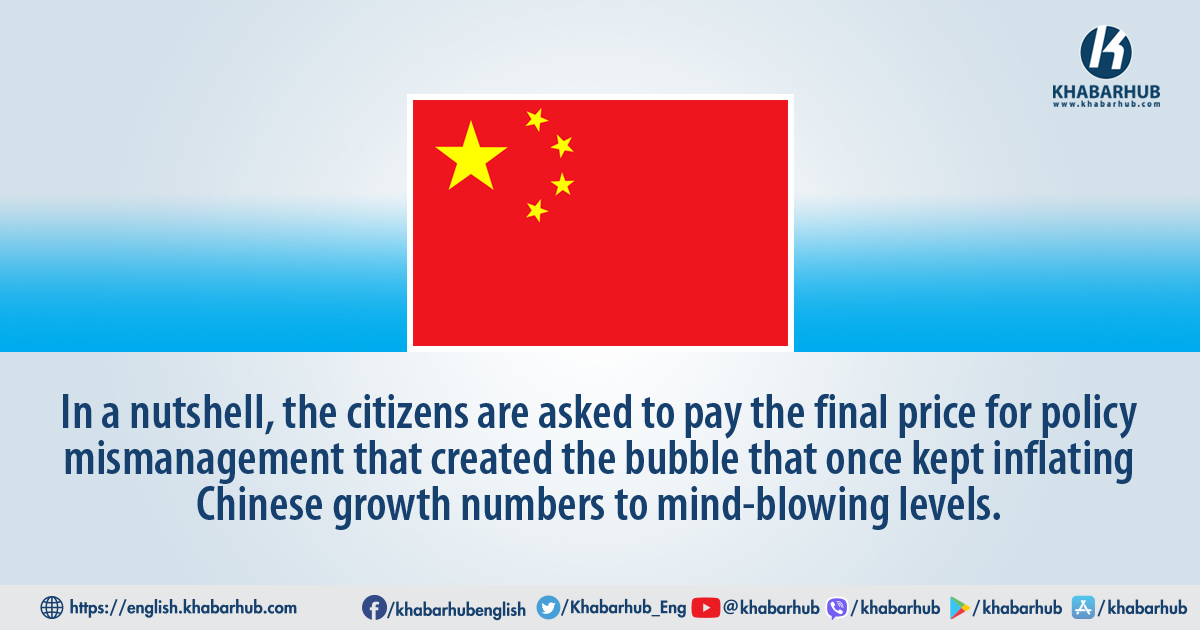According to ‘Trading Economics,’ the deposit Interest Rate in China averaged 1.03% from 1990 to 2023.
The highest was 3.15% in July 1993 and is now ruling at 0.35%. This is like the developed nations.
However, China is not a developed nation. It was definitely not so in 1990.
Yet China’s central bank kept the deposit rates low. Manufacturing and real estate were top gainers.
The common people of China paid the price. Their hard-earned money didn’t earn interest from the bank.
They do not trust their capital market. They had no safe choice to grow money.
The Chinese Communist Party (CCP) forced them to buy apartments as a means of investment. Property builders enjoyed every bit of it.
But China is not a democracy. CCP works overtime to rob political freedom. Worldwide death penalties by courts have been going down for the last few decades. Beijing does not give any official data on executions.
They had both access to dirt-cheap project finance from banks and assured flow of customers.
The bubble burst in 2021 when one after another builder, starting with Evergrande, started defaulting on loan repayment. Evergrande was China’s largest builder.
In 2018, it was declared as the world’s most valuable real-estate company. At the time of the loan default, the company was pursuing over 1300 projects in 280 Chinese cities.
Today it is the world’s most indebted real-estate company.
The share value is down by 90%. On June 29, a Hong Kong Court ordered the liquidation of the group.
As a former British Colony, Hong Kong still enjoys the fruits of a separate legal system.
The Chinese Communist Party (CCP)- run court in mainland China might be protecting Evergrande.
But that doesn’t help the common Chinese. Their lifetime savings are sunk. The property prices were on a free fall between 2021 and 2022.
The decline in property prices is arrested as Beijing pumps billions of dollars in deleveraging banks from sticky property loans.
But house buyers have no respite. They cannot exit from those bad investments as there are few buyers in the market.
The government has relaxed the mortgage payment schedule for the house buyers but they cannot escape paying.
In a nutshell, the citizens are asked to pay the final price for policy mismanagement that created the bubble that once kept inflating Chinese growth numbers to mind-blowing levels.
In any democratic country such gross policy failures would have caused the collapse of the government.
This has been their strategy in the past as well. All major consumers-starting from the US to India – had put up high tariff walls against Chinese imports, in the pre-Covid world.
But China is not a democracy. CCP works overtime to rob political freedom. Worldwide death penalties by courts have been going down for the last few decades. Beijing does not give any official data on executions.
However, several estimates suggest, that the rate of death penalties in China are world’s highest. Most of them are done unofficially.
Anyone who is perceived as a threat to the CCP or Xi Jinping’s rule simply vanishes. Voices are muted.
All those who dared to revolt against housing collapse, bank runs, covid lockdowns and/or economic misery are no longer traceable.
A democratic government is answerable to its people and faces an election every five years.
The Xi Jinping administration has no such obligations.
In January 2024, they cut the bank interest rates further to channel approximately $140 billion of public money to industry.
This is part of a $278 billion plan to boost a leaking economy.
Beijing wants its factories to scale up production and dump products at artificially low prices in the global market.
According to the United Nations, the number of Chinese asylum seekers increased by nearly five times between 2013 and 2023. Chinese economy reported a little over 5% growth in 2023.
This has been their strategy in the past as well. All major consumers-starting from the US to India – had put up high tariff walls against Chinese imports, in the pre-Covid world.
The global mood against Chinese dumping consolidated after the pandemic.
The West now wants to reduce the importance of China in global trade by diversifying sourcing hubs beyond China.
Apple Inc is now gearing up to source 25% of its global produce from India.
Moreover, as a safeguard against geopolitical tensions, the West is keen to rebuild a part of the production capacity in their geography.
The West will not let Beijing grow at its expense. Swiss solar panel maker Meyer Burger is complaining of major Chinese dumping.
The US is considering more tariff hikes to protect its interests. India is doing everything to keep Chinese technologies and technology products at bay.
Once an importer of solar panels, India exported panels worth $1.1 billion during April-October 2023.
The bottom line is simple: China can no longer take the world economy for a ride.
This is reflected in numbers. Despite mammoth stimulus, China’s manufacturing PMI (Purchasing Managers’ Index) is ruling below 50, indicating a contraction in manufacturing activity.
The world is not giving them a free pass anymore. Moreover, consumer confidence is at a historic low in China.
The common Chinese are under tremendous pressure from all sides. They are fleeing the country in great numbers.
According to the United Nations, the number of Chinese asylum seekers increased by nearly five times between 2013 and 2023. Chinese economy reported a little over 5% growth in 2023.
In 2024, they are projected to achieve 4.5% growth. The stagnation will continue in the foreseeable future.









Comment